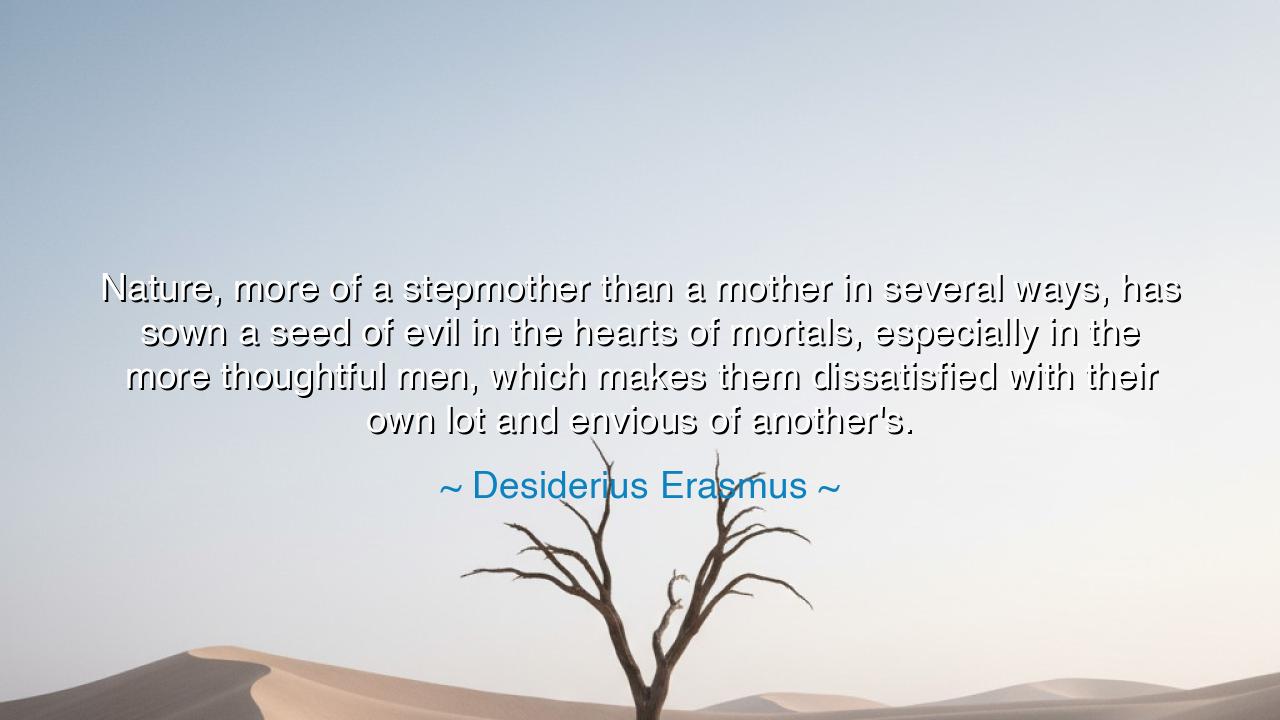
Nature, more of a stepmother than a mother in several ways, has
Nature, more of a stepmother than a mother in several ways, has sown a seed of evil in the hearts of mortals, especially in the more thoughtful men, which makes them dissatisfied with their own lot and envious of another's.






When Desiderius Erasmus declared, “Nature, more of a stepmother than a mother in several ways, has sown a seed of evil in the hearts of mortals, especially in the more thoughtful men, which makes them dissatisfied with their own lot and envious of another’s,” he gave voice to the ancient struggle within the human heart. His words are not merely lament but revelation: that within us all lies a restless seed of envy, planted not by choice but by the very fabric of our being. In calling Nature a stepmother, he speaks of her harshness, her cold impartiality, her refusal to nurture us into peace. She raises us with hunger in our bellies and longing in our souls, so that even the wisest cannot easily be content with what they hold.
To name this dissatisfaction is to recognize the wound of mortality itself. Man is given the gift of thought, and with thought comes comparison, and with comparison comes envy. The farmer, seeing his neighbor’s field greener, sighs. The poet, hearing another’s verse applauded, aches. Even the king, surrounded by splendor, eyes the realms of other kings with longing. Erasmus knew this torment well: that the very thoughtfulness which should elevate us can also deepen our unrest, for the more we see, the more we desire, and the more we desire, the less we are at peace.
History confirms this truth. Consider the story of Cain and Abel, the first brothers. Cain, dissatisfied with his own offering, looked upon Abel’s with envy. This seed of bitterness grew into murder, the first spilling of blood upon the earth. Was Cain lacking? No—his lot was enough to sustain him. But the restless fire of envy, sown by nature’s harsh hand, consumed him. What Erasmus describes is no passing flaw but an ancient inheritance, woven into the marrow of mankind.
And yet, the same envy that can destroy has also stirred men to greatness. The philosopher, envious of another’s wisdom, drives himself deeper into study. The artist, unsatisfied with her own canvas, strives to paint a masterpiece beyond compare. The danger lies not in the existence of this seed, but in our failure to master it. Left untended, envy grows into thorns that choke the spirit. But guided with discipline, it may drive us forward without consuming us whole. Thus, the stepmother of nature is cruel, but even cruelty may instruct.
The lesson for the seeker, then, is twofold: first, to recognize envy as part of the human condition, not as a unique curse upon oneself. Second, to discipline this force, turning dissatisfaction into fuel rather than poison. To envy blindly is to be enslaved, forever chained to the fortunes of others. But to transform envy into aspiration is to bend the stepmother’s cruelty into unexpected blessing. The fire that devours may also illuminate, if placed within the right vessel.
Practically, let each one act thus: when you feel the sting of envy, do not deny it, for denial breeds shadow. Instead, confront it with honesty. Ask yourself: “What in this other do I truly desire? And how may I pursue it with dignity, without hatred?” Train your heart to give thanks for your own portion, even while striving to grow. Practice daily gratitude, for gratitude waters contentment, and contentment starves envy of its strength.
So let Erasmus’s words be remembered as both warning and wisdom. Nature as stepmother has placed within us a seed of unrest, but we need not let it grow wild. In acknowledging our envy, in mastering our dissatisfaction, we transform bitterness into strength, jealousy into aspiration, longing into labor. And in this way, though nature may never fully be our mother, we may still make of her stern lessons a path to greatness.
Thus, the teaching is clear: accept your lot with humility, strive with dignity, and beware the creeping vine of envy. For it is not the possession of others that robs you of peace, but the failure to cherish the gifts already placed within your own hands.






AAdministratorAdministrator
Welcome, honored guests. Please leave a comment, we will respond soon